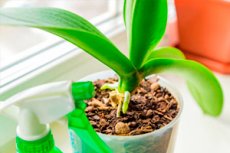Treatment of orchids with insecticides
Maria Popova, florist
Last reviewed: 29.06.2025
Last reviewed: 29.06.2025

Insecticides are chemical agents designed to eliminate harmful insects and protect plants from infestations. Treating plants with insecticides helps prevent or control pests such as aphids, spider mites, mealybugs, scales, and many others.
Types of insecticides by mode of action
- Contact insecticides:
- Act upon direct contact with insects.
- Provide quick results but have a short-lasting effect.
- Examples: pyrethroids (permethrin), malathion.
- Systemic insecticides:
- Absorbed by plant tissues and act from within.
- Effective against pests that feed on plant sap.
- Examples: imidacloprid, actara, confidor.
- Stomach insecticides:
- Affect the digestive system of insects.
- Used against chewing pests like caterpillars.
- Examples: chlorpyrifos, diazinon.
- Fumigants:
- Work through inhalation, forming toxic gases.
- Applied in greenhouses and enclosed areas.
- Examples: methyl bromide, phosphine.
Rules for treating plants with insecticides
1. Preparation for treatment
- Identify pests: determine which insects are affecting your plant.
- Choose the right insecticide: select a product suitable for the pest type.
- Weather conditions: apply insecticides during dry, windless weather or indoors.
2. Solution preparation
- Follow label instructions carefully.
- Do not exceed recommended concentrations to avoid leaf burn.
- Use clean, settled water.
3. Application process
- Apply early in the morning or late in the evening.
- Spray all plant parts, including the underside of leaves.
- Avoid spraying the soil unless instructed otherwise.
4. Safety precautions
- Wear protective gloves, masks, and goggles.
- Keep children and pets away from treated plants.
- Wash hands and face thoroughly after treatment.
Frequency of plant treatment with insecticides
- Prevention: once every 2-4 weeks.
- Treatment: every 7-10 days during severe infestations (no more than 3 consecutive treatments).
Common mistakes when using insecticides
- Excessive concentration: causes leaf and root burn.
- Frequent use: may lead to pest resistance.
- Application in sunny weather: causes leaf burns.
- Incomplete coverage: leaves some pests untreated.
Natural alternatives to insecticides
- Soap solution: 2 tbsp of liquid soap per 1 liter of water.
- Garlic infusion: 5 crushed garlic cloves per 1 liter of water.
- Wormwood decoction: 100 g of dried wormwood per 1 liter of water, steep for 24 hours.
Popular insecticides for plants
- Fitoverm: a biopesticide for mites, aphids, and mealybugs.
- Actara: a systemic insecticide effective against aphids and scale insects.
- Confidor: a systemic product for ornamental and vegetable plants.
- Actellic: a contact insecticide against a wide range of pests.
Conclusion
Treating plants with insecticides is an essential part of plant care, especially during pest outbreaks. Follow instructions carefully, take safety precautions, and apply treatments regularly to maintain healthy plants and prevent damage.
